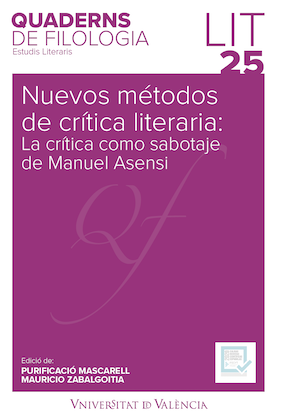Estudis fònics i crítica com a sabotatge: recitació poètica i afepto
DOI:
https://doi.org/10.7203/qdfed.25.18986Paraules clau:
Estudis fònics, Crítica com a sabotatge, Afepto. Resum
Resum
En aquest article s'analitzen les relacions que es poden establir entre els estudis fònics tradicionals i la teoria de la crítica com a sabotatge amb l'objectiu d'establir ponts entre tots dos. A partir del model de món que es troba en l'obra de Jaime Gil de Biedma, i mitjançant l'anàlisi de quatre versions recitades d'un dels seus poemes i de tres versions musicades d'aquest, es posa en relleu que les formes que adopta l'afepto tenen una clara influència sobre el model de món que cada versió comunica.
 Descàrregues
Descàrregues
Descàrregues
Publicades
Com citar
-
Resum348
-
PDF (Español)322
Número
Secció
Llicència
 Este obra está bajo una licencia de Creative Commons Reconocimiento-NoComercial-SinObraDerivada 4.0 Internacional.
Este obra está bajo una licencia de Creative Commons Reconocimiento-NoComercial-SinObraDerivada 4.0 Internacional.
Tots els documents inclosos a OJS són d'accés lliure i propietat dels seus autors i/o institucions editores, i per tant, qualsevol acte de reproducció, comercialització, comunicació pública o transformació total o parcial necessita el consentiment exprés i escrit d'aquests.
________
Authors who publish with this journal agree to the following terms:
- Authors retain copyright and grant the journal right of first publication with the work simultaneously licensed under a Creative Commons Attribution License that allows others to share the work with an acknowledgement of the work's authorship and initial publication in this journal.
- Authors are able to enter into separate, additional contractual arrangements for the non-exclusive distribution of the journal's published version of the work (e.g., post it to an institutional repository or publish it in a book), with an acknowledgement of its initial publication in this journal.
- Authors are permitted and encouraged to post their work online (e.g., in institutional repositories or on their website) prior to and during the submission process, as it can lead to productive exchanges, as well as earlier and greater citation of published work (See The Effect of Open Access).




